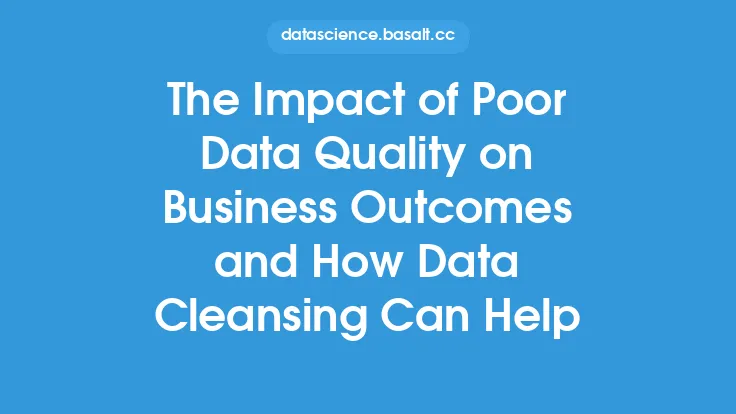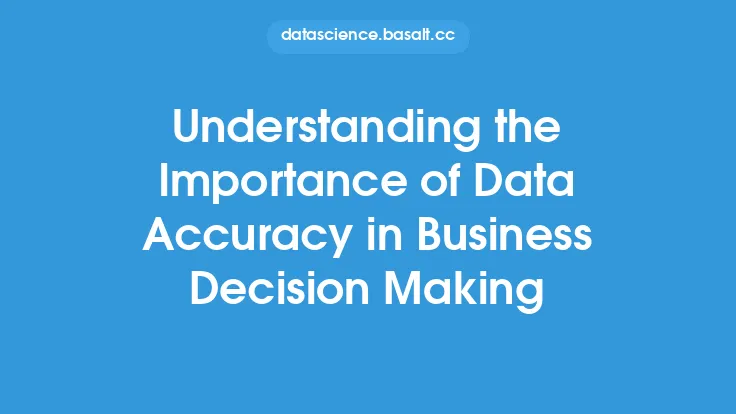In today's data-driven business landscape, organizations rely heavily on accurate and reliable data to inform their decision-making processes, drive growth, and stay competitive. However, data inaccuracy can have far-reaching consequences, impacting business outcomes in profound ways. The severity of these consequences is often underestimated, and it is essential to understand the implications of data inaccuracy on business performance.
Introduction to Data Inaccuracy
Data inaccuracy refers to the presence of errors, inconsistencies, or inaccuracies in data, which can arise from various sources, including human error, technical glitches, or inadequate data processing. Inaccurate data can lead to flawed analysis, misguided decisions, and ultimately, poor business outcomes. The impact of data inaccuracy can be felt across various aspects of an organization, from operational efficiency to strategic planning.
The Financial Impact of Data Inaccuracy
The financial implications of data inaccuracy can be significant, with estimates suggesting that poor data quality costs organizations an average of 15-20% of their revenue. Inaccurate data can lead to incorrect financial reporting, misallocated resources, and poor investment decisions. For instance, a company may overestimate its revenue or underestimate its expenses due to data errors, resulting in poor financial planning and decision-making. Furthermore, data inaccuracy can also lead to compliance issues, regulatory fines, and reputational damage, all of which can have a direct impact on an organization's bottom line.
The Operational Impact of Data Inaccuracy
Data inaccuracy can also have a significant impact on an organization's operational efficiency. Inaccurate data can lead to inefficient resource allocation, poor supply chain management, and inadequate customer service. For example, a company may overstock or understock products due to inaccurate demand forecasting, resulting in wasted resources and lost sales opportunities. Additionally, data inaccuracy can also lead to poor customer experience, as incorrect data can result in misdirected marketing efforts, inadequate customer support, and failed personalization attempts.
The Strategic Impact of Data Inaccuracy
The strategic implications of data inaccuracy can be far-reaching, influencing an organization's ability to make informed decisions and drive growth. Inaccurate data can lead to poor market analysis, inadequate competitive intelligence, and misguided strategic planning. For instance, a company may invest in a new market or product line based on inaccurate data, resulting in significant financial losses and reputational damage. Furthermore, data inaccuracy can also limit an organization's ability to innovate and adapt to changing market conditions, as flawed data can lead to poor insights and misguided innovation efforts.
The Technical Impact of Data Inaccuracy
From a technical perspective, data inaccuracy can have significant implications for an organization's data management and analytics capabilities. Inaccurate data can lead to poor data integration, inadequate data governance, and flawed data analysis. For example, a company may struggle to integrate data from different sources due to inconsistencies in data formatting or quality, resulting in poor data visibility and limited analytics capabilities. Additionally, data inaccuracy can also lead to poor data security, as incorrect data can create vulnerabilities that can be exploited by malicious actors.
Mitigating the Impact of Data Inaccuracy
To mitigate the impact of data inaccuracy, organizations must prioritize data quality and implement robust data management practices. This includes implementing data validation and verification processes, conducting regular data audits, and establishing data governance policies. Additionally, organizations must also invest in data analytics and visualization tools, which can help identify data inaccuracies and provide insights into data quality. By prioritizing data quality and implementing robust data management practices, organizations can minimize the impact of data inaccuracy and drive better business outcomes.
Conclusion
In conclusion, data inaccuracy can have far-reaching consequences for organizations, impacting business outcomes in profound ways. The financial, operational, strategic, and technical implications of data inaccuracy can be significant, and it is essential for organizations to prioritize data quality and implement robust data management practices. By understanding the impact of data inaccuracy and taking proactive steps to mitigate it, organizations can drive better business outcomes, improve operational efficiency, and stay competitive in today's data-driven business landscape.





